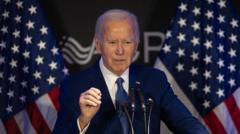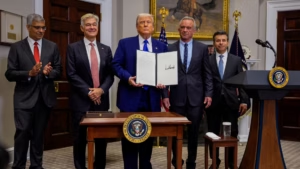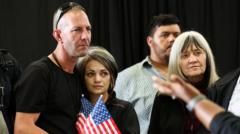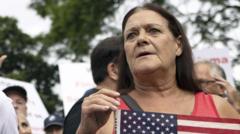In a recent address, President Cyril Ramaphosa condemned a group of 59 white South Africans who emigrated to the US, calling them "cowards" for fleeing rather than confronting the issues in South Africa. His remarks came as these Afrikaners received refugee status from President Trump, raising questions about the future of racial equity in their native country.
Ramaphosa's Bold Claims: Afrikaners in the US are "Cowards"
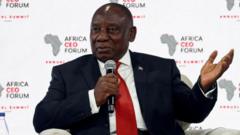
Ramaphosa's Bold Claims: Afrikaners in the US are "Cowards"
South African President Cyril Ramaphosa criticizes white Afrikaners seeking refuge in the US, labeling them as cowardly for leaving their homeland amidst ongoing racial tensions.
South African President Cyril Ramaphosa has stirred controversy by labeling a group of white Afrikaners, who recently resettled in the United States, as "cowards." The Afrikaners, numbering 59, arrived in the U.S. after securing refugee status from former President Donald Trump, who claimed they were escaping racial discrimination in their homeland.
Ramaphosa expressed his disapproval during an agricultural event in Free State province, asserting, "As South Africans, we are resilient. We don't run away from our problems. We must stay here and solve our problems. When you run away, you are a coward." He indicated that the decision to leave was a sign of unwillingness to support ongoing efforts aimed at addressing post-apartheid inequalities, dismissing claims of rampant violence against white farmers as unfounded.
The U.S. has faced criticism for supporting the relocation of Afrikaners, notably from Trump and South Africa-born Elon Musk, who allege a "genocide" against these farmers—a notion many experts contest. More than three decades post-apartheid, racial disparities persist in land ownership, with most prime farmland still under white control, thus igniting frustration about the slow pace of reform.
In January, Ramaphosa instituted a contentious law that enables the government to expropriate land without compensation under specific conditions. Yet, he clarified that this law has not yet been enacted against any landowners. During an Africa CEO forum, he relayed to Trump his perspective that the U.S. narrative regarding South Africa's demographic tensions does not reflect the truth.
In response to the display of support towards the relocated Afrikaners in the U.S., which included warm welcomes from officials citing fears of violence in South Africa, Ramaphosa reiterated that not all who left deserved refugee status. As tensions mount, he emphasized the importance of confronting national issues rather than fleeing them, expressing confidence that those who left would eventually return, as no other place like South Africa exists.
In addition, Trump has threatened potential action against South Africa if racial tensions are not adequately addressed during the forthcoming G20 summit. Ramaphosa's bold remarks have ignited discussions both at home and abroad, further complicating an already intricate issue of race relations in South Africa.




